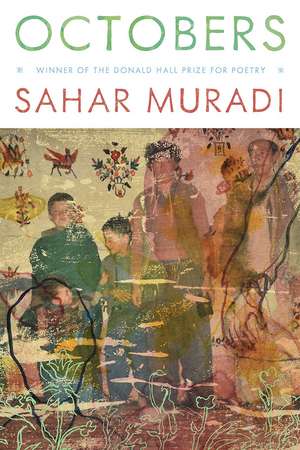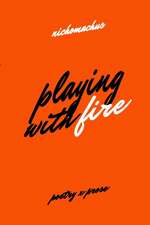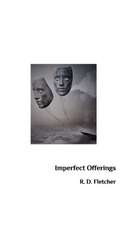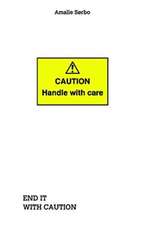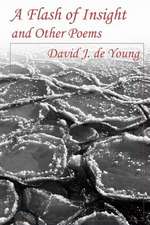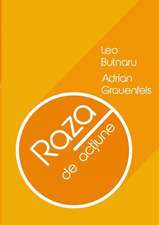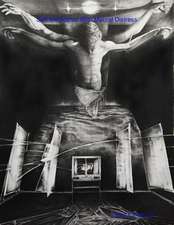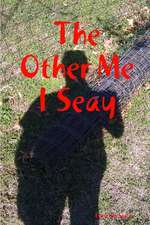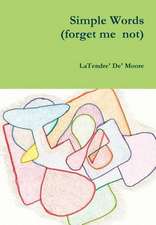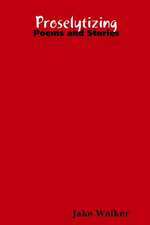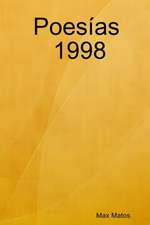OCTOBERS: Pitt Poetry Series
Autor Sahar Muradien Limba Engleză Paperback – 10 oct 2023
Octobers traces the four great tumults of the author’s life, all of which originated in that jagged month of different years: The US invasion and occupation of her native Afghanistan, the death of her father, the sudden end of a love, and the birth of her daughter. The poems chart heartbreak along a helix, progressively and recursively, where “echoes are inevitable.” Ultimately, the collection is concerned with language—as witness and buoy in the white waters of loss, as a tool for violences small and state-crafted, as an asymptote both approaching ideas of “home” and estranged from it, and, beyond it all and still, as a source of wild wonder.
Din seria Pitt Poetry Series
-
 Preț: 102.92 lei
Preț: 102.92 lei -
 Preț: 102.10 lei
Preț: 102.10 lei -
 Preț: 102.10 lei
Preț: 102.10 lei -
 Preț: 101.06 lei
Preț: 101.06 lei -
 Preț: 93.19 lei
Preț: 93.19 lei -
 Preț: 101.28 lei
Preț: 101.28 lei -
 Preț: 137.55 lei
Preț: 137.55 lei -
 Preț: 101.86 lei
Preț: 101.86 lei -
 Preț: 100.00 lei
Preț: 100.00 lei -
 Preț: 102.92 lei
Preț: 102.92 lei -
 Preț: 101.28 lei
Preț: 101.28 lei -
 Preț: 101.86 lei
Preț: 101.86 lei -
 Preț: 101.06 lei
Preț: 101.06 lei -
 Preț: 101.06 lei
Preț: 101.06 lei -
 Preț: 101.86 lei
Preț: 101.86 lei -
 Preț: 103.09 lei
Preț: 103.09 lei -
 Preț: 105.19 lei
Preț: 105.19 lei -
 Preț: 101.86 lei
Preț: 101.86 lei -
 Preț: 112.40 lei
Preț: 112.40 lei -
 Preț: 102.27 lei
Preț: 102.27 lei -
 Preț: 101.06 lei
Preț: 101.06 lei -
 Preț: 101.69 lei
Preț: 101.69 lei -
 Preț: 103.33 lei
Preț: 103.33 lei -
 Preț: 138.61 lei
Preț: 138.61 lei -
 Preț: 101.06 lei
Preț: 101.06 lei -
 Preț: 101.86 lei
Preț: 101.86 lei -
 Preț: 102.10 lei
Preț: 102.10 lei -
 Preț: 101.28 lei
Preț: 101.28 lei -
 Preț: 140.01 lei
Preț: 140.01 lei -
 Preț: 102.51 lei
Preț: 102.51 lei -
 Preț: 103.09 lei
Preț: 103.09 lei -
 Preț: 90.75 lei
Preț: 90.75 lei -
 Preț: 100.65 lei
Preț: 100.65 lei -
 Preț: 100.24 lei
Preț: 100.24 lei -
 Preț: 122.71 lei
Preț: 122.71 lei -
 Preț: 101.28 lei
Preț: 101.28 lei -
 Preț: 103.33 lei
Preț: 103.33 lei -
 Preț: 106.01 lei
Preț: 106.01 lei -
 Preț: 101.06 lei
Preț: 101.06 lei -
 Preț: 102.27 lei
Preț: 102.27 lei -
 Preț: 91.79 lei
Preț: 91.79 lei -
 Preț: 135.69 lei
Preț: 135.69 lei -
 Preț: 91.79 lei
Preț: 91.79 lei -
 Preț: 101.28 lei
Preț: 101.28 lei -
 Preț: 100.24 lei
Preț: 100.24 lei -
 Preț: 104.15 lei
Preț: 104.15 lei -
 Preț: 101.86 lei
Preț: 101.86 lei -
 Preț: 100.65 lei
Preț: 100.65 lei -
 Preț: 100.41 lei
Preț: 100.41 lei -
 Preț: 99.83 lei
Preț: 99.83 lei
Preț: 94.47 lei
Nou
Puncte Express: 142
Preț estimativ în valută:
18.08€ • 19.65$ • 15.20£
18.08€ • 19.65$ • 15.20£
Carte disponibilă
Livrare economică 31 martie-14 aprilie
Livrare express 14-20 martie pentru 36.53 lei
Preluare comenzi: 021 569.72.76
Specificații
ISBN-13: 9780822967088
ISBN-10: 0822967081
Pagini: 72
Dimensiuni: 146 x 222 x 10 mm
Greutate: 0.55 kg
Editura: University of Pittsburgh Press
Colecția University of Pittsburgh Press
Seria Pitt Poetry Series
ISBN-10: 0822967081
Pagini: 72
Dimensiuni: 146 x 222 x 10 mm
Greutate: 0.55 kg
Editura: University of Pittsburgh Press
Colecția University of Pittsburgh Press
Seria Pitt Poetry Series
Recenzii
"Muradi delivers proverbial insights and robust metaphors with mellifluous agility."
—Publishers Weekly
“Charged with bracingly original sight and sensibility, Octobers is a book that ruptures experiences of exile, ravages of empire, lavish griefs, and unspeakable bindings to reveal in them astonishing new musics. Muradi’s approach is radially expansive—this is a collection weaved out of thick strands of complex feeling and thought, geographic and psychic mappings, rhythmic vitality and kinetic structure. Not hyperbole: each line on every page is coiled, indelible in its impression. And beyond the viscosity of Muradi’s language and the urgency of her seeing, we have the staggering means by which the poems name, commemorate, interrogate, memorialize, sing, and fall silent. How long have I awaited this book? Muradi’s poems are those I feel protective over, so deeply do they shake and remake me. Hers is a voice you follow to its interminable reaches.”
—Jenny Xie, author of Eye Level
“Octobersis a richly gripping poem-journey through lives and languages, migrations/transitions, with profound openness to curious complexity. Sahar Muradi, born in Afghanistan, resident of New York City, employs subtly understated images, reeling us in to woven mysteries of time and story. Births, childhoods, cities, histories, quiet discoveries, studding the wide panoply of chaos and possibility—I loved the quietude of these brilliant scenes, their haunted reverberations. It’s as if Muradi is speaking up from a difficult, often silent space for those who are forced to flee, recalibrate, make new homes, somewhere, anywhere, right here: ‘this one morning with its distinct wink’—brilliant. I feel I have never read anything quite like this voice before—it’s rare and so important.”
—Naomi Shihab Nye, Donald Hall Prize judge and author of Everything Comes Next: Collected and New Poems
“Charged with a profound tenderness, Sahar Muradi’s Octobers announces the arrival of a wonderful new poet. These are variegated poems: about migration, about grief and giving birth, about Afghan cities and Floridian weather––but the shadow that arches over all of them, darkening the weather of these landscapes, is the violence of nation states, the repercussions of war. Muradi undoes language, weaves it anew: through ellipses, through snippets of Dari and Arabic, all the while singing of ‘white phosphorus over raqqa,’ of the orange wings of monarch butterflies, and the orange uniforms of Guantánamo. The fierce intelligence of her poems insists on the power of language to bring close again, or at least retrace, what is lost. This is a voice I have been waiting for.” —Aria Aber, author of Hard Damage
“Octobers inhabits a deeply intimate space between countries seeking wholeness in belonging. There is belief here: belief in father, belief in God, belief in the wilderness of motherland, and belief in home. The experiments in dialogue, in artistic form, poem as visual paintings, and the visceral momentum of the zuihitsu create a vocabulary of resistance and praise. There is complexity to the texture of the movement of bodies and its connection to self and the bonds that anchor it, as Sahar Muradi asks in one poem, ‘So much writing is born of longing. So much living.’ Muradi creates an astonishing new collection of poems that invites the reader to journey through the ‘intimate and holy,’ as it lives most fully in a devotional language, turning it into a tender yet mighty revelation.” —Tina Chang, author of Hybrida
“I’m in awe of this book. And proud. Sharp, keen, elegant, muscular:Octobersengages both the glories and madness of humanity with refined, rigorous, unapologetic wonder. Exile, homeland, occupation, war—which is to say: love—and time. I’ve been a strong admirer of Muradi’s poetry—literally—for decades, just waiting for this moment. In this resplendent debut, we are witnessing the arrival of a formidable new talent. These poems contain words ‘whose feet never touch the ground.’ Muradi yields meticulous prowess—fired and bolting hard—right from the gate.” —Robin Coste Lewis, author of To the Realization of Perfect Helplessness and Voyage of the Sable Venus
“[A] tender and humane investigation of the linguistic artifacts of two decades of the War on Terror (born in Afghanistan, Muradi lives in New York) characterizes the collection, as does a refusal to synthesize irreconcilably divided identities, languages, worldviews.”
—Poetry Society of America
—Publishers Weekly
“Charged with bracingly original sight and sensibility, Octobers is a book that ruptures experiences of exile, ravages of empire, lavish griefs, and unspeakable bindings to reveal in them astonishing new musics. Muradi’s approach is radially expansive—this is a collection weaved out of thick strands of complex feeling and thought, geographic and psychic mappings, rhythmic vitality and kinetic structure. Not hyperbole: each line on every page is coiled, indelible in its impression. And beyond the viscosity of Muradi’s language and the urgency of her seeing, we have the staggering means by which the poems name, commemorate, interrogate, memorialize, sing, and fall silent. How long have I awaited this book? Muradi’s poems are those I feel protective over, so deeply do they shake and remake me. Hers is a voice you follow to its interminable reaches.”
—Jenny Xie, author of Eye Level
“Octobersis a richly gripping poem-journey through lives and languages, migrations/transitions, with profound openness to curious complexity. Sahar Muradi, born in Afghanistan, resident of New York City, employs subtly understated images, reeling us in to woven mysteries of time and story. Births, childhoods, cities, histories, quiet discoveries, studding the wide panoply of chaos and possibility—I loved the quietude of these brilliant scenes, their haunted reverberations. It’s as if Muradi is speaking up from a difficult, often silent space for those who are forced to flee, recalibrate, make new homes, somewhere, anywhere, right here: ‘this one morning with its distinct wink’—brilliant. I feel I have never read anything quite like this voice before—it’s rare and so important.”
—Naomi Shihab Nye, Donald Hall Prize judge and author of Everything Comes Next: Collected and New Poems
“Charged with a profound tenderness, Sahar Muradi’s Octobers announces the arrival of a wonderful new poet. These are variegated poems: about migration, about grief and giving birth, about Afghan cities and Floridian weather––but the shadow that arches over all of them, darkening the weather of these landscapes, is the violence of nation states, the repercussions of war. Muradi undoes language, weaves it anew: through ellipses, through snippets of Dari and Arabic, all the while singing of ‘white phosphorus over raqqa,’ of the orange wings of monarch butterflies, and the orange uniforms of Guantánamo. The fierce intelligence of her poems insists on the power of language to bring close again, or at least retrace, what is lost. This is a voice I have been waiting for.” —Aria Aber, author of Hard Damage
“Octobers inhabits a deeply intimate space between countries seeking wholeness in belonging. There is belief here: belief in father, belief in God, belief in the wilderness of motherland, and belief in home. The experiments in dialogue, in artistic form, poem as visual paintings, and the visceral momentum of the zuihitsu create a vocabulary of resistance and praise. There is complexity to the texture of the movement of bodies and its connection to self and the bonds that anchor it, as Sahar Muradi asks in one poem, ‘So much writing is born of longing. So much living.’ Muradi creates an astonishing new collection of poems that invites the reader to journey through the ‘intimate and holy,’ as it lives most fully in a devotional language, turning it into a tender yet mighty revelation.” —Tina Chang, author of Hybrida
“I’m in awe of this book. And proud. Sharp, keen, elegant, muscular:Octobersengages both the glories and madness of humanity with refined, rigorous, unapologetic wonder. Exile, homeland, occupation, war—which is to say: love—and time. I’ve been a strong admirer of Muradi’s poetry—literally—for decades, just waiting for this moment. In this resplendent debut, we are witnessing the arrival of a formidable new talent. These poems contain words ‘whose feet never touch the ground.’ Muradi yields meticulous prowess—fired and bolting hard—right from the gate.” —Robin Coste Lewis, author of To the Realization of Perfect Helplessness and Voyage of the Sable Venus
“[A] tender and humane investigation of the linguistic artifacts of two decades of the War on Terror (born in Afghanistan, Muradi lives in New York) characterizes the collection, as does a refusal to synthesize irreconcilably divided identities, languages, worldviews.”
—Poetry Society of America
Notă biografică
Sahar Muradi is author of the chapbooks [ G A T E S ], A Garden Beyond My Hand, and Ask Hafiz: A Migration Story Told through Poetic Divination. She is coeditor of One Story, Thirty Stories: An Anthology of Contemporary Afghan American Literature and EMERGENC(Y): Writing Afghan Lives beyond the Forever War: An Anthology of Writing from Afghanistan and Its Diaspora, and coauthor of A Ritual in X Movements. She is a recipient of the Stacy Doris Memorial Poetry Award and the Patrons’ Prize for Emerging Writers from Thornwillow Press, as well as a finalist for the National Poetry Series and the Sustainable Arts Foundation. Sahar is cofounder of the Afghan American Artists & Writers Association and dearly believes in the bottom of the rice pot.
Extras
washee/was she
she was washee i told her you are
like your motherland a wilderness
needs a belt laid down two white
hotel towels took her into the tub to
wudu the boys out of her mouth pointed
her nipples toward qibla wiped clean
her intention to perform ruk’u as if
carrying a glass of chai on her back
fold at the knees palms to the ground
tucked her soles under her astaghfirullah
used country
in my used country I felt his teeth
circle as a mosquito the black mystery
he placed my right hand over my wrong
stain said he was bringing me home
offered me a suite with a lock a key in
the shape of a brother perhaps twenty-
two years old my body pure as a glass
table he spilled was she my boss on my
back at night came easy as a fly
to post-conflict faithfully
used my country
Grasping
1
Time, I am leaning into you
pushing all my chips to your corners.
Here in the grief of my hands,
in the elegies of grasping,
remind me how useful it was,
the arrow.
2
Lessons of infancy:
When he leaves the room,
he does not exist.
If I am hungry,
I am permitted to wail.
And above my head, the mobile.
What finer constellations outside myself.
3
Echoes are inevitable.
The long space behind my body,
the tall stem of day hissing through the clock,
avoiding the gaps.
What does it mean to live in the gaps,
in the places where it is groundless,
to be so open
to this one morning with its distinct wink?
4
Something about surrender.
At dawn, a pledge of white flags.
Turning over what I cannot hold:
a library of nouns.
What courage it takes to admit one’s size,
to polish the day over and over
grasping nothing.
counterparts
not all fear can be worked through
the ocean’s example, constantly emptying
the nasturtiums, she instructed me, were edible
we ate the leaf, then the flower
despite his clouds, he believes in life
how we tire of one another’s othering
I count the blessings
to keep from hurting him
the day circles
as a mosquito
when they lifted the cloth
I saw one that was not you
stood in my own corridor
and remarked the lack of windows
but I preferred to continually peel the orange and reject the fruit
wouldn’t it taste of heartbreak
I was invited to take flight into the red road
to place my palm on the rock that formed the scripture
grief being vital
its violence being necessary
I rub the shadows
even in the garden
the prison of living by conviction
so many prisons
I will move more slowly
and it will still be a move
eyes of little night
and so, aching
his voice high-pitched and proving himself
back into my own body, eyes
I believe in doom and all its sister griefs
I believe in my thoughts reducing me to negligible
I believe in the words that I make up to color myself
we may not like you, but we love you in a very special way
embarrassed of my lines that grow out of ether
and die in ether
feel the light shrink
the breath small
may you inch in the direction of trust
hold the tail of your instinct
may you fail and get up to see
you did not die
may you expose your poems to the u/v
to the later atmospheres of your own doubt
arrive with the bow taut, and he notices
asks if it’s pointed at him
i learned from my mother who left mines all across the house
the point was to startle us into guilt
imagine the future
as if your narrow divination could ever know
he and you will be two parallel lines
never touching
he will not leave
and you will punish him for that
what are the ways I try to be free
I wondered against the clock
a kind of life that is not certain
but alive
she spoke of fundamentalism
as the understandable reaction to capitalist consumerism
toys don’t satisfy the question
why am I here
I look for another answer
my answer is *
how to make perfect?
seal every corner? edge god out?
the gnarled root of time
I touched it; it did not speak
The problem was always
trying to explain my face to everyone
here is my will: bright as a firecracker
here is his will: brighter
in the eye, notice the lake
in the lake, behold the sunken boats
in the boats are worms gnawing on the past
at the bottom of the past is the solid earth
she was washee i told her you are
like your motherland a wilderness
needs a belt laid down two white
hotel towels took her into the tub to
wudu the boys out of her mouth pointed
her nipples toward qibla wiped clean
her intention to perform ruk’u as if
carrying a glass of chai on her back
fold at the knees palms to the ground
tucked her soles under her astaghfirullah
used country
in my used country I felt his teeth
circle as a mosquito the black mystery
he placed my right hand over my wrong
stain said he was bringing me home
offered me a suite with a lock a key in
the shape of a brother perhaps twenty-
two years old my body pure as a glass
table he spilled was she my boss on my
back at night came easy as a fly
to post-conflict faithfully
used my country
Grasping
1
Time, I am leaning into you
pushing all my chips to your corners.
Here in the grief of my hands,
in the elegies of grasping,
remind me how useful it was,
the arrow.
2
Lessons of infancy:
When he leaves the room,
he does not exist.
If I am hungry,
I am permitted to wail.
And above my head, the mobile.
What finer constellations outside myself.
3
Echoes are inevitable.
The long space behind my body,
the tall stem of day hissing through the clock,
avoiding the gaps.
What does it mean to live in the gaps,
in the places where it is groundless,
to be so open
to this one morning with its distinct wink?
4
Something about surrender.
At dawn, a pledge of white flags.
Turning over what I cannot hold:
a library of nouns.
What courage it takes to admit one’s size,
to polish the day over and over
grasping nothing.
counterparts
not all fear can be worked through
the ocean’s example, constantly emptying
the nasturtiums, she instructed me, were edible
we ate the leaf, then the flower
despite his clouds, he believes in life
how we tire of one another’s othering
I count the blessings
to keep from hurting him
the day circles
as a mosquito
when they lifted the cloth
I saw one that was not you
stood in my own corridor
and remarked the lack of windows
but I preferred to continually peel the orange and reject the fruit
wouldn’t it taste of heartbreak
I was invited to take flight into the red road
to place my palm on the rock that formed the scripture
grief being vital
its violence being necessary
I rub the shadows
even in the garden
the prison of living by conviction
so many prisons
I will move more slowly
and it will still be a move
eyes of little night
and so, aching
his voice high-pitched and proving himself
back into my own body, eyes
I believe in doom and all its sister griefs
I believe in my thoughts reducing me to negligible
I believe in the words that I make up to color myself
we may not like you, but we love you in a very special way
embarrassed of my lines that grow out of ether
and die in ether
feel the light shrink
the breath small
may you inch in the direction of trust
hold the tail of your instinct
may you fail and get up to see
you did not die
may you expose your poems to the u/v
to the later atmospheres of your own doubt
arrive with the bow taut, and he notices
asks if it’s pointed at him
i learned from my mother who left mines all across the house
the point was to startle us into guilt
imagine the future
as if your narrow divination could ever know
he and you will be two parallel lines
never touching
he will not leave
and you will punish him for that
what are the ways I try to be free
I wondered against the clock
a kind of life that is not certain
but alive
she spoke of fundamentalism
as the understandable reaction to capitalist consumerism
toys don’t satisfy the question
why am I here
I look for another answer
my answer is *
how to make perfect?
seal every corner? edge god out?
the gnarled root of time
I touched it; it did not speak
The problem was always
trying to explain my face to everyone
here is my will: bright as a firecracker
here is his will: brighter
in the eye, notice the lake
in the lake, behold the sunken boats
in the boats are worms gnawing on the past
at the bottom of the past is the solid earth
Descriere
Winner of the 2022 Donald Hall Prize for Poetry
